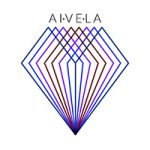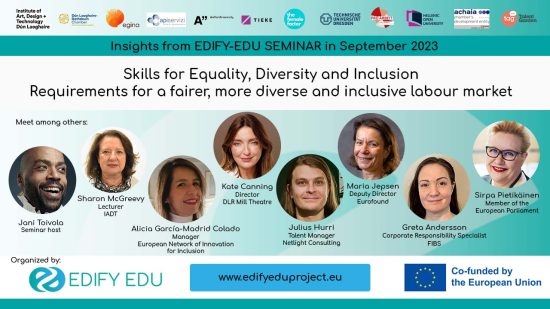The goal of the EDIFY-EDU project is to provide concrete tools and learning pathways that enable organizations to develop their DEI (Diversity, Equity, and Inclusion) competencies and build a more inclusive working life. The target groups for the trainings include, among others, students in leadership education, management of SMEs, HR professionals, and employees interested in the topic.
The project is implemented by TIEKE, Aalto University/CKIR, and partners from Ireland, Italy, Austria, Greece, and Germany. The training supports broader efforts to respond to evolving workplace skill needs and promote sustainable development in organizations.
Employer perspective: new ideas and strategic support
Many employers were motivated to host learners to strengthen their DEI strategies and gain fresh perspectives:
“The learner brought us new insights and challenged us to think about how we communicate our DEI values externally. That was truly valuable.”
Feedback emphasized that learners introduced new ideas and sparked discussions about building a more inclusive workplace. Several organizations reported using learners’ input to improve internal communications and recruitment practices. In some cases, the collaboration even led to future employment opportunities for the learners.
Student perspective: meaningful tasks and career clarity
Learners described their experiences as inspiring and instructive. They engaged in meaningful tasks such as DEI communications, event planning, and internal process development. Experiences of success and opportunity to have their voices heard were especially appreciated:
“I especially remember facilitating a DEI discussion in the workplace. It was exciting but incredibly rewarding.”
Many said the experience deepened their interest in DEI and helped clarify their career goals. One learner shared that the experience confirmed their desire to become a strong DEI advocate in the future. The learning period was seen not only as an educational opportunity but also a way to influence socially significant issues.
How can organizations support diversity and inclusion?
DEI should be embedded into organizational structures and culture—not left solely to HR. Key actions include:
- Leadership commitment: Strategic support and examples create the basis for the participation of the whole organization.
- Manager training: Awareness and skills directly impact workplace climate.
- Clear responsibilities and metrics: Assign DEI leaders and set measurable goals.
- Accessibility: Ensure physical, psychological, linguistic, and digital accessibility.
- Psychological safety: Enable open dialogue and participation.
- Effective intervention processes: Clear procedures for addressing discrimination and inappropriate behavior.
How to improve employee engagement with DEI?
Engagement grows when DEI is genuinely part of everyday operations and strategy:
- Leadership example and value-based work: DEI must be visible in strategy and values.
- Shared understanding: Clarifying concepts and encouraging discussion fosters participation.
- Personal reflection: Encourage employees to consider their own backgrounds, power dynamics, and privileges.
- Training and involvement: Opportunities to gain experience and participate increase commitment.
Communicating DEI goals and actions
Communication should be open, honest, and ongoing:
- Authenticity: Avoid “pinkwashing”—acknowledge challenges too.
- Training as part of communication: DEI training is a key part of internal and external communication.
- Transparency: For example, universities can offer DEI training on open platforms.
Encounters and development
The EDIFY-EDU project aimed not only to provide learning experience but also to build bridges between students and working life. Many meaningful encounters took place during the work-based learning periods, some of which have led to continued collaboration.
Building future collaboration
The future is built together. It is important to evaluate collaboration and its outcomes. Feedback indicates that the project met its goals and that partners are eager to continue working together in future initiatives. Companies also expressed interest in sharing their experiences through their own networks.
“Working with TIEKE was smooth and flexible. We received support and materials that made it easier to guide the learner.”
TIEKE is grateful for all the feedback received during the project—it provides a valuable foundation for developing future trainings and workplace collaboration. Working together helps shift attitudes and bring practical DEI solutions into working life.
EDIFY-EDU project
An international project supporting the strengthening of diversity both in Finnish society and in all partner countries. The project implemented a comprehensive international training program focused on EDI/DEI (equality, diversity, inclusion) competencies.
- Objective: To build an international training program aimed at developing leadership skills in equality, diversity, and inclusion.
- Deliverables:
- A MOOC course and specialization studies for SMEs and leadership students
- Work-based learning period focused on DEI themes in organizations promoting diversity
- Target Groups: SME leadership, leadership students, and HR professionals
- Duration: 2022–2025
- Funder: Erasmus+ Program












